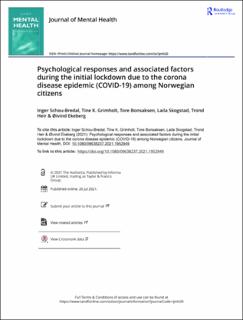| dc.contributor.author | Bredal, Inger Schou | |
| dc.contributor.author | Grimholt, Tine Kristin | |
| dc.contributor.author | Bonsaksen, Tore | |
| dc.contributor.author | Skogstad, Laila | |
| dc.contributor.author | Heir, Trond | |
| dc.contributor.author | Ekeberg, Øivind | |
| dc.date.accessioned | 2021-07-29T09:32:32Z | |
| dc.date.available | 2021-07-29T09:32:32Z | |
| dc.date.created | 2021-07-26T20:10:10Z | |
| dc.date.issued | 2021 | |
| dc.identifier.citation | Journal of Mental Health. 2021, 1-9. | en_US |
| dc.identifier.issn | 0963-8237 | |
| dc.identifier.uri | https://hdl.handle.net/11250/2765589 | |
| dc.description | This is an Open Access article distributed under the terms of the Creative Commons Attribution-NonCommercial-NoDerivatives License, which permits non-commercial re-use, distribution, and reproduction in any medium, provided the original work is properly cited, and is not altered, transformed, or built upon in any way | en_US |
| dc.description.abstract | Background
Ongoing COVID-19 studies pay little attention to the risk or protective factors related to psychological stress.
Aims
This study aims to estimate the prevalence of anxiety, depression and insomnia during the initial phase of the COVID-19 outbreak, and explore factors that might be associated with these outcomes.
Methods
A population-based cross-sectional survey was conducted using snowball-sampling strategy. Participants from 18 years or older filled out an anonymous online questionnaire.
Results
A total of 4527 citizens filled out the questionnaire. Prevalence rates were; insomnia 31.8%, anxiety 17.1% and depression 12.5%. Risk factors associated with anxiety, depression and insomnia were being single (OR = 0.75, OR = 0.57, OR = 0.59), unemployed (OR = 0.47, OR = 0.53, OR = 0.73), financial concerns (OR = 1.66, OR = 2.09, OR = 1.80) at risk for complication from COVID-19 (OR = 1.63, OR = 1.68, OR = 1.60), and being generally worried due to the COVID-19 (OR 0 3.06, OR = 1.41, OR = 1.74).
Conclusion
Being single, unemployed, at risk of health complications, or having concerns because of financial or other consequences of the pandemic are associated with mental health adversities such as anxiety, depression and insomnia during a pandemic lockdown. | en_US |
| dc.language.iso | eng | en_US |
| dc.rights | Attribution-NonCommercial-NoDerivatives 4.0 Internasjonal | * |
| dc.rights.uri | http://creativecommons.org/licenses/by-nc-nd/4.0/deed.no | * |
| dc.title | Psychological responses and associated factors during the initial lockdown due to the corona disease epidemic (COVID-19) among Norwegian citizens | en_US |
| dc.type | Peer reviewed | en_US |
| dc.type | Journal article | en_US |
| dc.description.version | publishedVersion | en_US |
| dc.rights.holder | (c) 2021 The Author(s). Published by Informa UK Limited, trading as Taylor & Francis Group. | en_US |
| dc.source.pagenumber | 1-9 | en_US |
| dc.source.journal | Journal of Mental Health | en_US |
| dc.identifier.doi | 10.1080/09638237.2021.1952949 | |
| dc.identifier.cristin | 1922718 | |
| cristin.ispublished | true | |
| cristin.fulltext | original | |
| cristin.qualitycode | 1 | |

